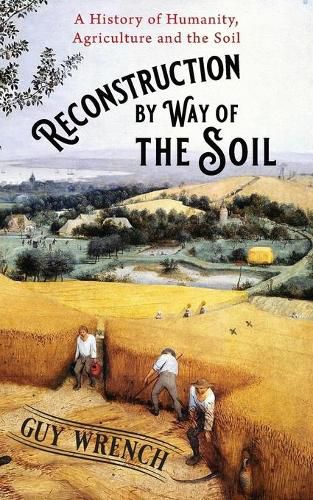Readings Newsletter
Become a Readings Member to make your shopping experience even easier.
Sign in or sign up for free!
You’re not far away from qualifying for FREE standard shipping within Australia
You’ve qualified for FREE standard shipping within Australia
The cart is loading…






This title is printed to order. This book may have been self-published. If so, we cannot guarantee the quality of the content. In the main most books will have gone through the editing process however some may not. We therefore suggest that you be aware of this before ordering this book. If in doubt check either the author or publisher’s details as we are unable to accept any returns unless they are faulty. Please contact us if you have any questions.
Our agriculture is wrongly based. It is a system largely directed at curing evils which it itself is responsible for. It is the wisdom of the country and the traditional farmers we need now; the wisdom of those who have built up long-lasting agriculture and whose wisdom lies in tradition. They have fashioned it through physical work and close and immediate observation; through the personal intimacy with nature which we have come to associate with the poet.
In fact, peasant life is poetic, and it is so precisely because of this intimacy. The music, dance and art of peasants are the creative expression of their lives, and as such are characteristic of their environments and the land on which they live.
Nothing collective or traditional, as peasant life is, originates from people separated from the soil, as are townfolk.
The poems and essays that played a notable part in the country life of the Chinese, the Tibetan art which finds its way into every home, the sylvan setting of Japanese villages, of the Balinese and Burmese, the vocal harmony of Swiss peasants returning from their fields, the reproduction of floral beauty and colour in festive dress of so many countries; these are the product of the poet that lies in every peasant’s heart.
It is this intimacy that inspires creativity in the poet, as the Greeks recognized in their choice of word for poet, namely, a ‘maker’ or creator, and which Dante voiced in the Divine Comedy, when he wrote that the poet was not the disciple of the imagination, but rather one who knows the secrets of nature.
CONTENTS
Introduction Rome The Roman Foods The Roman Family Soil Erosion in ancient Rome Farmers and Nomads Contrasting Pictures Banks for the Soil The Economics of the Soil The English Peasant Primitive Farmers Nyasa Tanganyika Humanity and the Earth Sind and Egypt Fragmentation The East and West Indies The German Colonies: The Mandates Russia, South Africa, Australia The United States of America A Kingdom of Agricultural Art in Europe An Historical Reconstruction Summary A Plan for Action
$9.00 standard shipping within Australia
FREE standard shipping within Australia for orders over $100.00
Express & International shipping calculated at checkout
This title is printed to order. This book may have been self-published. If so, we cannot guarantee the quality of the content. In the main most books will have gone through the editing process however some may not. We therefore suggest that you be aware of this before ordering this book. If in doubt check either the author or publisher’s details as we are unable to accept any returns unless they are faulty. Please contact us if you have any questions.
Our agriculture is wrongly based. It is a system largely directed at curing evils which it itself is responsible for. It is the wisdom of the country and the traditional farmers we need now; the wisdom of those who have built up long-lasting agriculture and whose wisdom lies in tradition. They have fashioned it through physical work and close and immediate observation; through the personal intimacy with nature which we have come to associate with the poet.
In fact, peasant life is poetic, and it is so precisely because of this intimacy. The music, dance and art of peasants are the creative expression of their lives, and as such are characteristic of their environments and the land on which they live.
Nothing collective or traditional, as peasant life is, originates from people separated from the soil, as are townfolk.
The poems and essays that played a notable part in the country life of the Chinese, the Tibetan art which finds its way into every home, the sylvan setting of Japanese villages, of the Balinese and Burmese, the vocal harmony of Swiss peasants returning from their fields, the reproduction of floral beauty and colour in festive dress of so many countries; these are the product of the poet that lies in every peasant’s heart.
It is this intimacy that inspires creativity in the poet, as the Greeks recognized in their choice of word for poet, namely, a ‘maker’ or creator, and which Dante voiced in the Divine Comedy, when he wrote that the poet was not the disciple of the imagination, but rather one who knows the secrets of nature.
CONTENTS
Introduction Rome The Roman Foods The Roman Family Soil Erosion in ancient Rome Farmers and Nomads Contrasting Pictures Banks for the Soil The Economics of the Soil The English Peasant Primitive Farmers Nyasa Tanganyika Humanity and the Earth Sind and Egypt Fragmentation The East and West Indies The German Colonies: The Mandates Russia, South Africa, Australia The United States of America A Kingdom of Agricultural Art in Europe An Historical Reconstruction Summary A Plan for Action